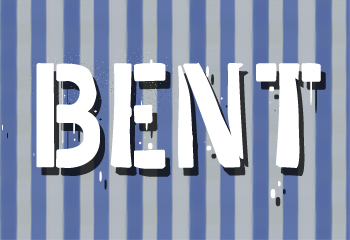
The horrific majesty that is Bent, written Martin Sherman, directed by Denis McCourt for the Long Beach Shakespeare Company, begins with the title and pulses through the script, into the actors, and out to the audience (tears, mouths agape, a paralysis before getting up to leave). Bent can mean hell bent on something, as in doing whatever it takes to survive. It can mean slightly demented, as in killing your lover and committing the most heinous act imaginable because the situation says you should. And in European slang it means homosexual. All these definitions resonate through a production that describes with staggering clarity the fate of three gay men in World War Two nazified Germany.
The set is stark, like a slaughterhouse turned into a prison, just as the prospects for the characters are stark. The audience forms a rectangle around the stage: when, in a deft bit of stagecraft, a Nazi guard shines his flashlight into our eyes, we either hold our breath with fear or want to poke him in the kidney with a dagger. The stage is configured as a confined space within a larger room, which is a nice metaphor for the story itself: a microcosm of what was going on throughout Europe. Besides showing the tedium of the relentless struggle to just-get-by, the closed quarters also emphasizes dialogue that contrasts exuberance at still being alive and consequences that follow gut-wrenching moral decisions. The phrasing and pacing of the dialogue carries the story, particularly in two scenes that offer the concentration camp equivalent of phone sex.
It reads as a documentary, a testament that describes the at-first furtive though vibrant gay scene in Berlin that quickly devolves into a tale of horror of two men on the run, one of whom ends up in a concentration camp. It's apparent there is a way to survive the ordeal, except that it means losing one identity (homosexual), assuming another (Jewish), losing compassion, learning to double deal, forgetting how to care, learning how to be indifferent. Of course, it's a viable mechanism but, as we learn, it's untenable in the long run.
But it's set up as a love story. Max (Douglas Myers) cares for Rudy (John McCutcheon), Rudy cares for Max. Rudy puts up with Max's drunken blackouts, the men he brings home, Max becomes Rudy's protector, for Max may be delightfully decadent but he's a fighter, a survivor, while Rudy is a delicate flower, not long for the world. Then Max meets Horst (Toby Gant) and so the process begins anew. The story turns in the middle of a train ride when Max makes an abrupt, reptilian brain decision and does what he has to do. The new Max gets by in the camp, speaks the language of the guards. But what happens when the new Max has to deal with another senseless, irrational loss? He becomes the old Max, the one we identified with at the beginning and the one whose impression we take home with us at the end.
The playwright humanizes the characters, ensuring that the production's not peopled with glib abstractions or fuzzy stereotypes. The characters are fleshed out and, through their various reactions to the dystopia unfolding around them, able to elicit and hold onto our sympathies. Myers makes Max lovable, conditionally despicable, and, regardless of what we think, able to navigate between survival and surrender. Though you despise him irrevocably beyond measure for the two things he did in the space of a few minutes on the train, you sort-of understand because a) war is war and b) put in that same predicament, wouldn't you have done the same?
Rudy doesn't plod through life, he pirouettes over it. McCutcheon confers ethereal grace and fragility into his dancer, his caretaker of plants, as well as a naiveté that, in another place, at another time, would have been charming but there, then, in that black and white world of survival, was nothing more than a liability.
And Gant's Horst, the polar opposite of Rudy, is pragmatic. He assumes the default posture of a noble resignation to his fate. He takes the world on its own terms, whereas Rudy tried to ignore it and Max tried to renegotiate it on different terms.
The story describes the trade-offs we make with ourselves, those close to us, and the world at large. Perhaps you can vaguely apprehend the statistical horror of ten million dead, but when it's played out with three men on a stark stage, you fully experience what was at stake, what was lost, never to be regained. Through this memorable production you learn that it wasn't ten million people killed at one time but ten million individual stories of loss, horror, and dehumanization.
Performances are 8pm, Fri. & Sat., 2pm, Sun. The show runs until Oct. 9. Tickets are $10-20 The theatre is located at 4250 Atlantic Ave. For more info call 562-997-1494 or visit www.lbshakespeare.org.
